Welcome back to This Week in Apps, the Extra Crunch series that recaps the latest OS news, the applications they support and the money that flows through it all. What are developers talking about? What do app publishers and marketers need to know? How are politics impacting the App Store and app businesses? And which apps are everyone using?
This week we look at how the Black Friday weekend played out on mobile (including which non-shopping category that saw a boost in revenue!), as well as a few security-related stories, TikTok’s latest bad press, plus Apple and Google’s best and most downloaded apps of 2019, and more.
Headlines
80% of Android apps are encrypting traffic by default
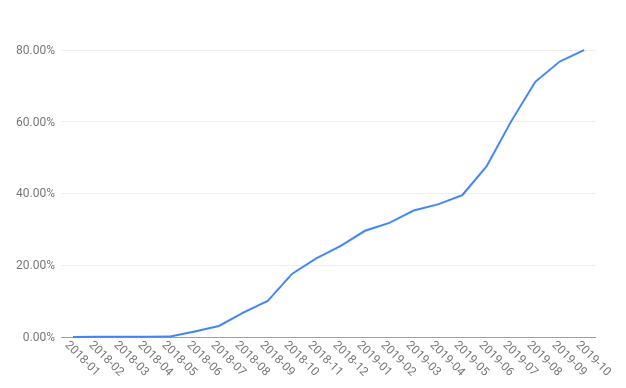 Google gave an update on Android security this week, noting that 80% of Android applications were encrypting traffic by default, and that percentage was higher for apps targeting Android 9 or higher, with 90% of them encrypting traffic by default. Android protects the traffic entering or leaving the devices with TLS (Transport Layer Security). Its new statistics are related to Android 7’s introduction of the Network Security Configuration in 2016, which allows app developers to configure the network security policy for their app through a declarative configuration file. Apps targeting Android 9 (API level 28) or higher automatically have a policy set by default that prevents unencrypted traffic for every domain. And since Nov. 1, 2019, all apps (including app updates) must target at least Android 9, Google says. That means the percentages will improve as more apps roll out their next updates.
Google gave an update on Android security this week, noting that 80% of Android applications were encrypting traffic by default, and that percentage was higher for apps targeting Android 9 or higher, with 90% of them encrypting traffic by default. Android protects the traffic entering or leaving the devices with TLS (Transport Layer Security). Its new statistics are related to Android 7’s introduction of the Network Security Configuration in 2016, which allows app developers to configure the network security policy for their app through a declarative configuration file. Apps targeting Android 9 (API level 28) or higher automatically have a policy set by default that prevents unencrypted traffic for every domain. And since Nov. 1, 2019, all apps (including app updates) must target at least Android 9, Google says. That means the percentages will improve as more apps roll out their next updates.
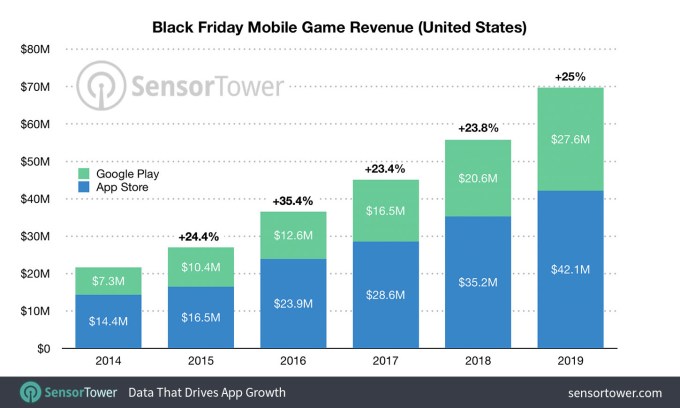 Black Friday boosted mobile game revenue to a record $70M
Black Friday boosted mobile game revenue to a record $70M
U.S. sales holiday Black Friday wasn’t just good for online shoppers, who spent a record $7.4 billion in sales, $2.9 billion from smartphones. It also boosted iOS and Android mobile game revenue to a single-day record of $69.7 million in the U.S., according to Sensor Tower. This was the most revenue ever generated in a single day for the category, and it represents a 25% increase over 2018. Marvel Contest of Champions from Kabam led the day with approximately $2.7 million in player spending. Two titles from Playrix — Gardenscapes and Homescapes — also won big, with $1 million and $969,000 in revenue, respectively.
These increases indicate that consumers are looking for all kinds of deals on Black Friday, not just those related to holiday gift-giving. They’re also happy to spend on themselves in games. Mobile publishers caught on to this trend and offered special in-game deals on Black Friday which really paid off.
Did Walmart beat Amazon’s app on Black Friday?
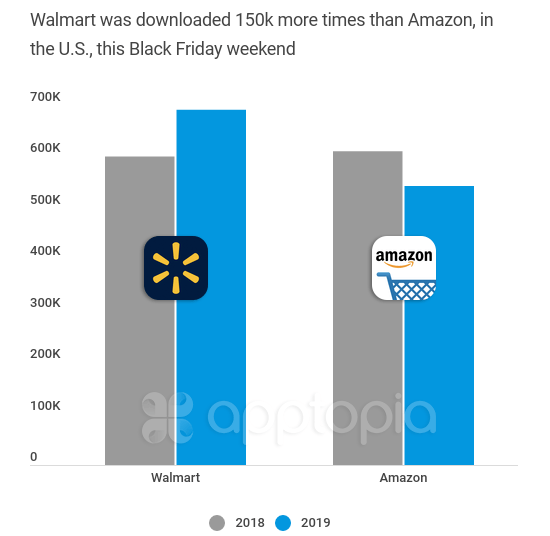 Sensor Tower and Apptopia said it did. App Annie also said it did, but then later took it back (see update). In any event, it must have been a close race. According to Sensor Tower, Walmart’s app reached No.1 on the U.S. App Store on Black Friday with 113,000 new downloads, a year-over-year increase of 23%. Amazon had 102,000 downloads, making it No. 2.
Sensor Tower and Apptopia said it did. App Annie also said it did, but then later took it back (see update). In any event, it must have been a close race. According to Sensor Tower, Walmart’s app reached No.1 on the U.S. App Store on Black Friday with 113,000 new downloads, a year-over-year increase of 23%. Amazon had 102,000 downloads, making it No. 2.
Arguably, many Amazon shoppers already have the app installed, so this is more about Walmart’s e-commerce growth more so than some ding on Amazon.
In fact, Apptopia said that Amazon still had 162% more mobile sessions over the full holiday weekend — meaning Amazon was more shopped than Walmart.
More broadly, mobile shopping is still huge on Black Friday. The top 10 shopping apps grew their new installs by 11% over last year on Black Friday, to reach a combined 527,000 installs.
Report: Android Advanced Protection Program could prevent sideloading
Google’s Advanced Protection Program protects the accounts of those at risks of targeted attacks — like journalists, activists, business leaders, and political campaign teams. This week, 9to5Google found the program may get a new protection feature with the ability to block sideloading of apps, according to an APK breakdown. What’s not yet clear is if program members will have the option to disable the protection, but there are some indications that may be the case. Another feature the report uncovered appears to show that Play Protect will automatically scan all apps, including those from outside the Play Store. This won’t affect the majority of Android users, of course, but it is an indication of where Google believes security risks may be found: sideloaded apps.
Bug hunter suggests Security.plist standard for apps

Amateur bug hunter and security researcher Ivan Rodriguez proposed a new security standard for iOS apps, called Security.plist. Inspired by the Security.txt, a security standard proposed for websites, the Security.plist file would be embedded in the root of iOS apps and would contain all the basic details for reporting a security flaw to the app’s creator. That way, security researchers would have an easy way to reach out to app developers.
“I spend most of my free time poking mobile applications which has lead me to find many vulnerabilities and I have yet to find one that has an easy way to find the correct channel to responsibly disclose these issues,” Rodriguez told ZDNet, which this week reported on his plans.
The researcher also published a website about Security.plist which lets developers easily generate a basic file to include in their apps.
TikTok admits it suppressed videos by disabled, queer, and fat people
Following a report from Netzpolitik, TikTok admitted it had policies in place for a time that were designed to suppress the reach of content created by users assumed to be “vulnerable to cyberbullying.” The policy included examples of what content to suppress, including: “people with facial disfigurement, autism, Down syndrome,” and “disabled people or people with some facial problems such as birthmark, slight squint and etc.” Netzpolitik’s list also included people whose bios had hashtags like #fatwoman or #disabled or had rainbow flags or other LGBTQ identifiers. TikTok said the policies were no longer in use but were intended as a way to identify videos where users may be subject to bullying. It says it has since changed policies in favor of more “nuanced anti-bullying policies.”
The news is another example of TikTok’s ill-guided decisions on how to approach moderation and the latest in a string of bad press for the popular video meme and lip-sync app. The Chinese-owned company has already been accused of censoring topics like the Hong Kong protests (which it denies). It also took down then reinstated a teen’s account who talked about Chinese detention camps in her videos. It’s under investigation by the U.S. government over national security concerns, as well. And next week, TikTok chief Alex Zhu is headed to the U.S to meet with lawmakers to discuss its future in the U.S.
Oh, and TikTok was sued twice last week. One involved an Illinois family who sued TikTok for collecting the personal data of minors without consent. That case was settled in a day. A California college student also sued the company for allegedly sending her data to servers in China.
Apple brings Memoji and Animoji to its Clips app
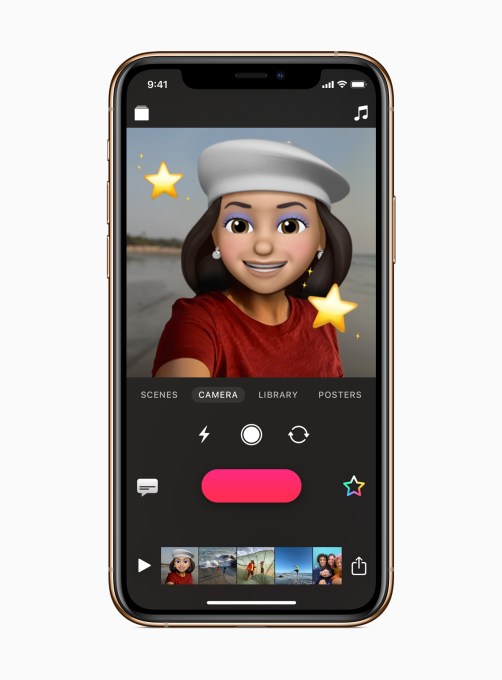 Remember Clips? Apple’s free video creation app for iPhone and iPad launched in 2017 as a more lightweight alternative to iMovie with features like filters, stickers, and transitions. This week, Apple updated Clips with support for Memoji and Animoji as well as new Disney Mickey and Minnie Mouse stickers. The new version will allow users to create videos with their own personalized Memoji and favorite Animoji characters, including the custom Memoji they’ve created in iMessage.
Remember Clips? Apple’s free video creation app for iPhone and iPad launched in 2017 as a more lightweight alternative to iMovie with features like filters, stickers, and transitions. This week, Apple updated Clips with support for Memoji and Animoji as well as new Disney Mickey and Minnie Mouse stickers. The new version will allow users to create videos with their own personalized Memoji and favorite Animoji characters, including the custom Memoji they’ve created in iMessage.
Apple’s animated, personalized emoji was touted as a selling point for Apple devices, but it’s possible that some people are tiring of the fun characters. In iOS 13.3, there’s an option to turn off Memoji from appearing in your emoji keyboard. The update to Clips may be aiming to reignite interest in Apple’s cooler-than-Bitmoji offering, by turning Memoji into another tool for video-makers to use.
Apple and Google reveal the best apps and games of 2019
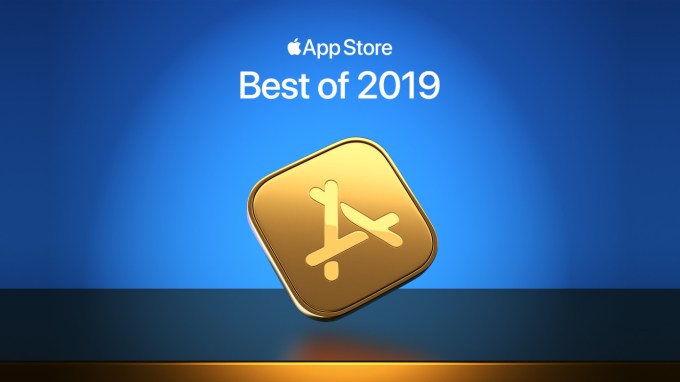 Continuing their annual tradition, Apple and Google this week revealed their list of the best apps and games of 2019. Apple, for the first time, held a real-world event to celebrate its winners, where it crowned AI-powered camera app Spectre Camera as its best iPhone app of the year and Sky: Children of the Light as its best mobile game. Google, meanwhile, dubbed video messaging app Ablo as its app winner and Call of Duty: Mobile as its best game. Other Apple winners included Flow by Moleskin (iPad app of the year); Affinity Publisher (best Mac app); The Explorers (best Apple TV app); Wonder Boy: The Dragon’s Trap (best Apple TV game); and Sayonara Wild Hearts (best Apple Arcade game).
Continuing their annual tradition, Apple and Google this week revealed their list of the best apps and games of 2019. Apple, for the first time, held a real-world event to celebrate its winners, where it crowned AI-powered camera app Spectre Camera as its best iPhone app of the year and Sky: Children of the Light as its best mobile game. Google, meanwhile, dubbed video messaging app Ablo as its app winner and Call of Duty: Mobile as its best game. Other Apple winners included Flow by Moleskin (iPad app of the year); Affinity Publisher (best Mac app); The Explorers (best Apple TV app); Wonder Boy: The Dragon’s Trap (best Apple TV game); and Sayonara Wild Hearts (best Apple Arcade game).
This was also the first year Apple Arcade has been around, so it’s interesting to see that Apple broke this out into its own category. It’s not clear, however, if an Arcade title will ever be able to win the best game (overall), or it can only win within its category.
Most Downloaded Apps and Games of 2019

In addition to Apple’s editorially selected “Best of” lists, the App Store also featured the year’s winners in terms of downloads — that is, the 2019 Top Charts. According to Apple, the most downloaded free app of the year was YouTube and the most downloaded paid app was Facetune. Meanwhile, the most downloaded free game of the year was Mario Kart Tour and the most downloaded paid game was Minecraft.
Among the top free apps, Facebook is feeling the effects of shifting consumer interests. Its main app is no longer in the top 5, but thanks to Instagram it has the No. 2 spot and Messenger gives it No. 5. Facebook-owned WhatsApp (No. 13) also makes the cut. But Snapchat’s growing traction can be seen in this list as well, with both of its apps ranking well — No. 3 for Snapchat and No. 19 for Bitmoji. Plus, Snapchat platform app YOLO made the list at No. 16. TikTok had a big year, too, and regularly topped the App Store. But it “only” scored the No. 4 spot when all was said and done. Still, it’s ahead of Facebook whose clone-and-destroy engine is in high gear.
Leading the 2019 free games chart was Mario Kart Tour, which is all the more impressive given that it launched in September, giving it fewer months to gain downloads. It also beat out the strong competition from Call of Duty: Mobile, which saw over 170 million downloads in its first 2 months.
The 2019 Top Charts are as follows (in order):
Top free apps of 2019:
YouTube, Instagram, Snapchat, TikTok, Messenger, Gmail, Netflix, Facebook, Google Maps, Amazon, Spotify, DoorDash, WhatsApp, FaceApp, Uber, YOLO, Hulu, Venmo, Bitmoji, Google Chrome
Top paid apps of 2019: Facetune, HotSchedules, Dark Sky Weather, The Wonder Weeks, AutoSleep Track Sleep on Watch, TouchRetouch, Procreate Pocket, Sky Guide, Toca Hair Salon 3, Scanner Pro: PDF Scanner App, kirakira+, Forest – Stay Focused, SkyView, Camera+ 2, TonalEnergy Tuner & Metronome, Water Minder, My Macros+, Things 3, Cute CUT Pro, Full Fitness: Exercise Workout Trainer.
Top free games of 2019: Mario Kart Tour, Color Bump 3D, aquapark.io, Call of Duty: Mobile, BitLife – #1 Life Simulator, Polysphere – art of puzzle, Wordscapes, Fortnite, Roller Splat!, AMAZE!!, Paper.io 2, Fun Race 3D, Helix Jump, Crowd City, Roblox, Draw It, Words Story, Traffic Run!, Run Race 3D, Mr Bullet – Spy Puzzles
Top paid games of 2019: Minecraft, Heads Up!, Plague Inc., Bloons TD 6, Geometry Dash, Rebel Inc., The Game of Life, Stardew Valley, Bloons TD 5, Grand Theft Auto: San Andreas, Papa’s Freezeria To Go!, True Skate, Pocket City, Terraria, Kingdom Rush Vengeance, Pocket Build, Trivia Crack (No Ads), Five Nights at Freddy’s, Donut Country, Exploding Kittens
Downloads
Instead of picking an App of the Week and Game of the Week, we’re shifting this section to feature the apps you need to know about — and there may be more than two! The apps or games in this section may be either new or newly updated, and they’ll have made headlines during the week for one reason or another.
Craigslist
A whopping 11 years after the App Store launched, Craigslist has rolled out its own official app. The app is available on iOS and in beta on Android and offers a faithful replication of the website. As TechCrunch said: it’s “useful, unfussy and anonymous.”
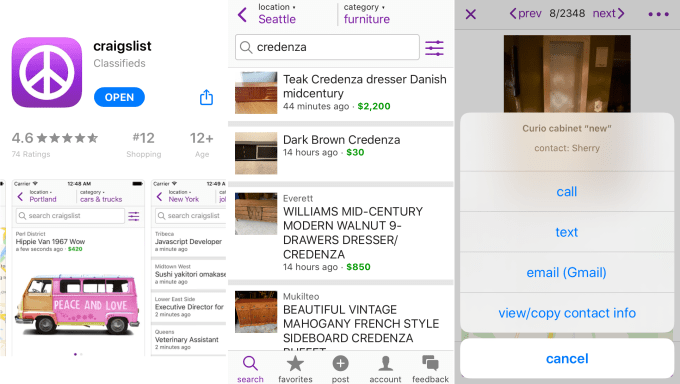
But Craiglist’s market has already been served by a number of third-party Craigslist apps. And now, Craigslist is at risk of becoming irrelevant thanks to newer competitors including Facebook Marketplace, OfferUp, letgo, Mercai, Nextdoor and other places to find deals. One has to wonder if the increased competition finally pushed Craiglist to participate in the mobile era.
Melee
Imgur has launched its first spin-off. The Imgur app today is used by 300 million people every month, thanks in large part to its ties with the Reddit community. Now the company is launching a product it hopes can stand on its own with Melee, an iOS app designed to serve the gaming community.
Melee users can subscribe to their favorite games in order to create a personalized feed filled with memes and gameplay clips related to those titles.
This is something that Imgur itself could have made a product feature, but it clearly wants to establish a new brand that more narrowly targets a specific audience. The company also believes Melee could serve as a place for new and upcoming streamers to share clips and gain a following, outside of Twitch and YouTube where bigger stars dominate.
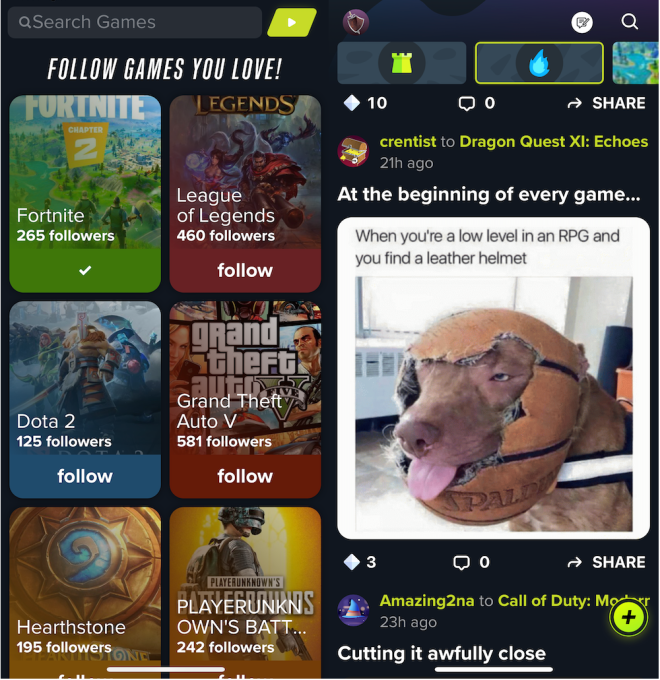
It’s not clear there’s a huge demand for yet another place for gaming clips and memes, however. On launch day, Melee only ranked No. 256 in the App Store’s Entertainment category. A day later and it’s dropped to below No. 1,500.
Peloton

Makers of the cringy-est holiday ad you’ll ever see, Peloton was also in the news this week for its new set of apps.
Its just-launched TV app is, for now, a Fire TV exclusive. Of course, if Peloton’s target market is already-slim-and-fit vloggers in fancy houses (whose husbands’ approval they seek), then they’re definitely going to need to expand to other TV platforms in the future. Because only regular people use the super affordable if somewhat bland Fire TV. It’s definitely not the TV platform of choice for those who care about how their device looks.
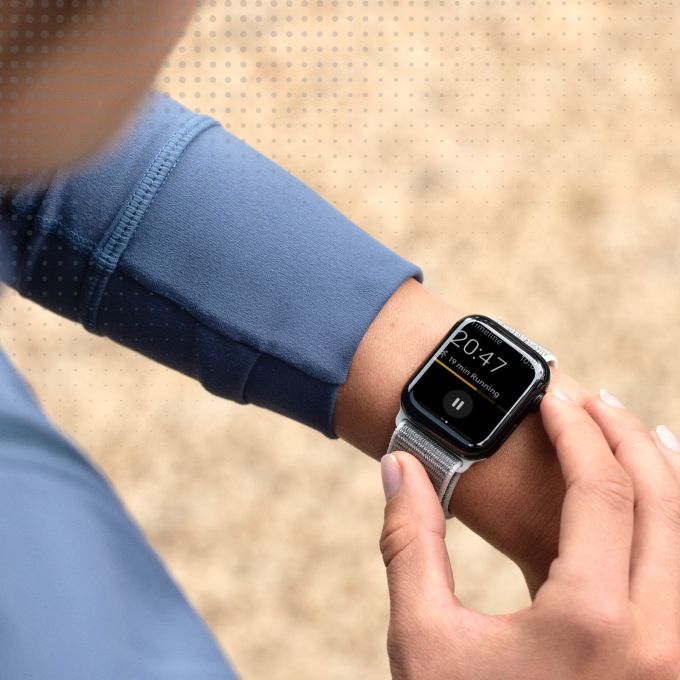
In all seriousness, Peloton’s Apple Watch app may be the more notable of the two launches. The app lets iPhone app users access running and heart rate workouts, including pace and distance metrics you can see on your Watch during indoor runs. The heart rate metrics will also display on both the iPhone and Apple Watch. And the data is saved so you can see after your class how well your workout went.
The app itself is fairly basic — it serves information you can see at a glance, and lets you adjust the music volume with the digital crown. But it’s easily going to become a must-have for Peloton members. It’s also a reminder of how critical a role the Apple Watch plays for fitness apps. It’s no longer acceptable for fitness companies to forgo addressing the platform. If anything, Peloton was late to do so.